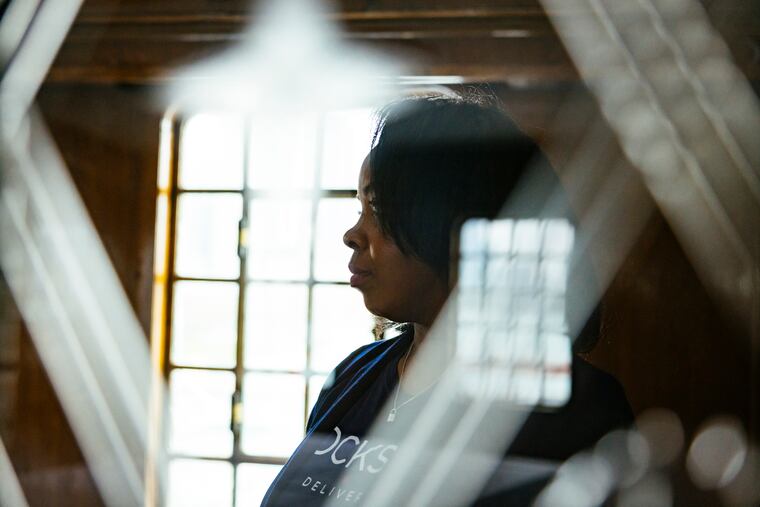A Black business boom has emerged after COVID recession
In the early months of the pandemic, Black-owned small businesses closed at twice the rate of other businesses. Then Black business ownership rebounded, soaring higher than it had been pre-pandemic.

The rib joint and whiskey bar that Terri Evans opened in the South Loop of Chicago with her 401(k) savings drew mostly tourists and convention-goers — until the coronavirus pandemic and stay-at-home orders swept the country beginning March 2020. Evans worried about keeping her 12 full-time employees on the payroll.
"When things went dark, they went really dark," said Evans, 47. "It was time to get creative and a little scrappy."
She decided to start a new business delivering food and liquor to the city's boating community, spread among Chicago's 10 harbors on Lake Michigan.
In the early months of the pandemic, Black-owned small businesses closed at twice the rate of other businesses, with 41% shutting down, according to April 2020 census data. Concentrated in the retail, restaurant and other service industries, Black-owned businesses had a harder time pivoting, given pandemic restrictions. They operated on thinner margins, lacked relationships with banks, and were shut out of the federal government’s relief program for small businesses.
Then Black business ownership rebounded, soaring higher than it had been pre-pandemic, a Washington Post analysis of Bureau of Labor Statistics data showed. In 2021, Black-owned small businesses were created at the fastest clip in at least 26 years.
Evans’ restaurant, Windy City Ribs & Whiskey, is two miles from the water and the city’s 6,000 boat slips. She launched Dockside Delivery on her restaurant’s website in May 2020 in hopes of catering to this new clientele.
"I'm going to focus on this audience that still has money, who's still hanging out in the middle of this pandemic," she said.
She started at the closest harbor, favored by established, mostly white boaters. They were not initially welcoming. “They were like, ‘Why are you in my harbor trying to sell me food packages?’” she said.
Her business hit its stride later that summer when she focused on the Black boating community, especially younger female charter owners. "They were going to figure out how to make me win," Evans said. "I realized I should have always started within my community."
She brought in other struggling female- and Black-owned restaurants, offering menu options from Cajun to organic salads and sandwiches. Her operations team picked up the orders and made the deliveries. Her liquor license — and the relaxation of liquor laws to allow alcohol delivery — made the business profitable. She was able to retain her full staff even though she had stopped serving lunch at the restaurant.
Now she’s looking to expand Dockside Delivery to other cities with larger boating communities, such as Miami, by 2023. First, she needs the capital and the technological resources to create an app. But her parents had always warned her against carrying debt.
“The only way to scale is to use money to scale,” Evans said. “Otherwise, you stay a small business. It’s minimal thinking that you can’t bet on yourself enough to go out and get a loan.”
After pivoting successfully at the start of the pandemic, some Black-owned businesses now confront the economic challenges of labor shortages, supply chain delays, and inflation.
Tyrone Foster, owner of a 20-employee landscaping company in Portland, Ore., had expected his residential clientele to dry up during the pandemic recession. He got certified as a minority-owned business in hopes of landing commercial and public works contracts with more stable budgets.
His company, Precision Landscape Services, obtained a two-year contract maintaining a 10-mile stretch for the city's transportation network in October 2020, work that represents roughly 10% of his business.
To his surprise, demand for outdoor living spaces shot up as families hunkered down at home.
“People were like, ‘OK, I’m not going anywhere. I don’t want to just stay inside and have a muddy mess in my backyard. I’m going to transform this into some kind of oasis that I could enjoy during the pandemic,’” said Foster, 51.
His company ended 2020 with record revenue. But the clamor for residential landscaping services amid a hot real estate market soon outpaced his ability to deliver. Without enough workers, Foster found himself turning away 50% of potential clients.
"I was sick about it," he said. "I could literally have doubled the size of the business if I could have hired people. I couldn't find anybody."
He offered a $1,000 signing bonus, which he increased to $1,500 after receiving no applicants. He offered employees a $1,500 referral bonus for every new hire they brought. With no takers, he pooled the bonuses and advertised a raffle for those who worked three months of the summer to win $10,000 in September.
"Goose eggs! Nothing! It still didn't move people," Foster said. "At that point I gave up. There's nothing else I could do."
He said some people didn’t want to jeopardize their health by working, even after he began paying workers mileage to follow the company truck in their own cars to avoid having more than one person in a vehicle. Others told him they could get by on federal stimulus checks. And he faced competition from other companies, such as Amazon aggressively hiring for warehouse jobs and Taco Bell offering managers $100,000 a year. (Amazon founder Jeff Bezos owns the Washington Post.)
Wages, gas, product and material costs have also risen. Equipment, replacement parts, even plants have become harder to source.
And he expects demand for landscaping to plateau as people begin spending their time — and budget — on travel, restaurants and other experiences. Families who had dropped $20,000 to $100,000 on yard makeovers won’t need large-scale work for at least five more years, he said.
Foster said his profits in 2021 dropped by more than 2%. Yet in March, he bought another landscaping company across the river in Vancouver, Wash., bringing on 15 employees.